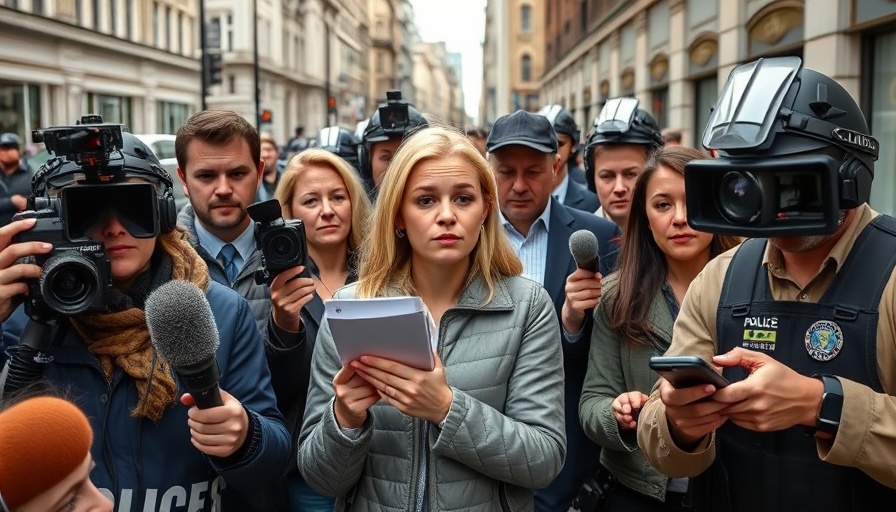
What Mahmoud Khalil's Arrest Means for Free Speech and Activism in America
On Saturday night, the arrest of Palestinian activist Mahmoud Khalil sent ripples through Columbia University and beyond, challenging the boundaries of free speech and political expression in America. Khalil, a prominent figure leading protests on campus against the Gaza conflict, was apprehended by federal agents in an act that many are denouncing as politically motivated repression.
The Context Behind Khalil's Arrest
Khalil, who was living in university-owned housing, was stopped by ICE agents under the pretext of executing an order to revoke his green card, despite being a lawful permanent resident. The Department of Homeland Security claimed that he led activities aligned with Hamas, a designation that has ignited heated debates about the lines between legitimate political dissent and terrorism.
This arrest occurs in a climate of heightened scrutiny toward pro-Palestinian activism, especially on university campuses. Following Khalil's involvement in protests demanding a ceasefire in Gaza, the Trump administration's response has been swift and severe. Secretary of State Marco Rubio stated that foreign nationals who support terrorist organizations will face potential visa revocation, continuing a pattern of targeting dissent amidst the ongoing Israel-Hamas conflict.
A Groundswell of Support and Outcry
The backlash against Khalil’s arrest has been significant, with protests erupting in New York City and voices from civil liberties organizations expressing alarm. The American Civil Liberties Union's Ben Wizner described the arrest as “unprecedented,” asserting that a lawful resident cannot be penalized for expressing political beliefs, even when they are unpopular. This sentiment was echoed in statements from the Council on American-Islamic Relations, decrying the actions as an affront to free speech.
Since Khalil's arrest, demonstrations have erupted not just at Columbia but in cities across the country, illustrating a robust defense of civil liberties and the right to protest. Activists are drawing parallels between Khalil's story and broader issues of free expression under threat, positioning the case as a litmus test for America's commitment to civil rights.
Political Context and Broader Implications
The Trump administration's hardline stance on free speech on campuses, particularly in relation to pro-Palestinian movements, raises critical questions about the implications for political discourse in America. The move to link dissenting opinions with terrorism creates a dangerous precedent that threatens to chill activism and discourage students from voicing their views.
Political experts caution that the implications of using immigration enforcement as a tool against political dissent are profound. They highlight concerns that Khalil's arrest is indicative of a broader strategy to stifle activism, especially among young people who are increasingly involved in social movements for justice.
Free Speech: A Fragile Right
At the heart of Khalil's case is the First Amendment, which guarantees the right to free speech and assembly. Former ACLU Director Burt Neuborne emphasized that if Khalil's arrest is tied to the content of his protests, it constitutes an outright violation of these fundamental rights. This moment serves as a critical reminder of the fragility of civil liberties in a polarized political climate.
Opponents argue that accusations of antisemitism in response to Palestinian advocacy are often used to silence legitimate discourse, stressing the importance of distinguishing between criticism of a state and hate speech. The outcry over Khalil's detention reflects a growing unease about what critics see as a crackdown on dissent.
Moving Forward: Activism in the Face of Repression
Khalil's arrest highlights the ongoing struggle for free expression, particularly among marginalized communities advocating for change. Advocates assert that now is the time to stand firm and continue the fight for rights, as Khalil himself did. Many believe that his case will galvanize further activism, uniting voices across the spectrum in the quest for justice and equality.
Students and activists surrounding Khalil's case represent an emergent generation committed to addressing systemic injustices globally. This arrest has not silenced their voices, instead energizing a movement that challenges both domestic and foreign policy that many see as unjust.
Conclusion: A Call to Action
As the legal battle for Mahmoud Khalil unfolds, the conversations sparked by his arrest will shape the future of activism and civil rights in America. It calls for solidarity among those favoring free speech and a pledge to protect such rights vigorously. Those who care about the integrity of democratic expression must remain vigilant and engaged, ensuring that the lessons learned from Khalil's ordeal resonate far beyond Columbia University.
 Add Row
Add Row  Add
Add 




Write A Comment